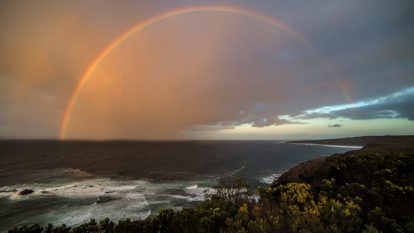

COVID 19 and the climate crisis are intimately connected. There’s compelling research that the continued destruction of natural habitat will lead to more outbreaks due to humanity’s increased overlap with the formerly wild, and because of animal and microbe migration to newly warm geographies.
George Monbiot, amongst others, has also pointed out that our current brush with pseudo-scarcity is simply an aperitif for the true deprivation that will accompany a global temperature rise between 3-4°C. What’s more, our current level of meat consumption means industrial farming relies on preventative antibiotics, the perfect environment to grow drug-resistant bacteria that can step in once the next pandemic hits.
But it’s not all doom and gloom.
While devastating, in the grand scheme of things, COVID is a kind of warning shot – the earth telling us that rampant plundering of resources and burning of fossil fuels won’t be tolerated for much longer before the planet returns to the calm bliss of single celled organisms chilling in rock pools for a couple of billion years.
For brands and big business there are broadly two sustainability responses in the time of COVID: use this as a smokescreen to slip out of even paying lip service to climate concerns, or stay true to climate pledges and assure consumers that climate remains not just important, but crucial to a future that possesses at least some of the convenience and visceral social connection we’d taken for granted for so long.
It’s no surprise that the fossil fuel industry would use this as a time to back away from any climate concern they claim to have – especially in the context of oil prices slipping below zero, something which they’re predicted to do again. The story is similar for businesses in a range of industries, from farming to aviation. A number of airlines, for example, are seeking bailouts without environmental conditions attached – presumably so the recent drop in emissions that has allowed cities to emerge from dystopian grey fog can quickly be reversed to be shrouded again in a choking cloak of unbridled excess.
But while ‘Coronavirus Profiteers’ are as worrying and frustrating as they are predictable, there are many brands and businesses taking this opportunity to put their money where their mouths are on sustainability.
Let’s look at some principles for keeping sustainability at the forefront of brand actions during and after COVID, so we can continue driving more sustainable behaviour change in consumers and more sustainable operations in business.
As part of Earth Day, Timberland, who have pledged to plant 50 million trees by 2025, shared its ad ‘Caring is not enough’. The ad features the voice of a child directly addressing nature to explain our current absence, and to promise that when we come back, we’ll treat nature better. It’s a moving invitation to take action (as simply caring isn’t enough), that’s seamlessly tied to the issues we now face because of COVID. In the acknowledgement of our dialogue with nature, we move away the idea that the world is a human playground to be used as we see fit, to a desire for a healthy relationship with an entity deserving of respect, and from which we need to ask forgiveness. But the overriding feeling coming away from the ad is one of hope – that the beauty of the natural world is still vibrant and will endure if we treat it correctly.
Fashion is an industry highly disrupted by COVID, and yet 17 more apparel brands have signed up to the Ellen MacArthur Foundation’s Jeans Redesign Project since the full force of the pandemic hit. This initiative, to tackle waste, pollution, and harmful practices associated with the production of denim is part of the vanguard trying to change fashion’s ‘bad habits’. Brands like Balzac Paris, unspun, and Wrangler who’ve pledged to take part in difficult times now have a powerful story to tell about their ethics and dedication to sustainability.
Amsterdam has taken to heart Kate Raworth’s 2017 book, Doughnut Economics: Seven Ways to Think Like a 21st-Century Economist, and are planning to employ the model to fix the economic difficulties that will inevitably be left in the wake of COVID. The model establishes two concentric rings (hence the doughnut): the inner ring reflects the minimum requirements for a good human life, while the outer ring reflects the environment’s carrying capacity. Living in the baked goodness of the doughnut’s middle means we’re not destroying the planet while people are given a good quality of life. Crucially it’s a model that doesn’t rely on infinite growth on a finite planet. So, we might ask ourselves, if a whole city can do it, why can’t your business do it?
This is a time to reframe and restructure your business for a more sustainable future by understanding our new context – where sustainability is now immediately and directly linked to mortality in a way it has not been in the past – and proving to consumers that it is a real purpose for your brand or business. The various websites listing those who’ve helped vs. those who’ve shirked responsibilities during COVID is evidence that actions in this time will linger, so why not use this crisis as a catalyst for real and meaningful change by showing that you, as business leaders, and as humans, really care?
There is no vaccine for the climate crisis. It takes each of us to care enough to take action to prevent a catastrophe compared to which COVID is merely an appetiser. But it’s still not too late to course correct and head towards a greener, fairer, and happier future.
There’s nothing more critical or more important than making socially and environmentally progressive choices. We’re here to have that conversation with you. Get in touch.
For more like this straight to your inbox, sign up to our newsletter.